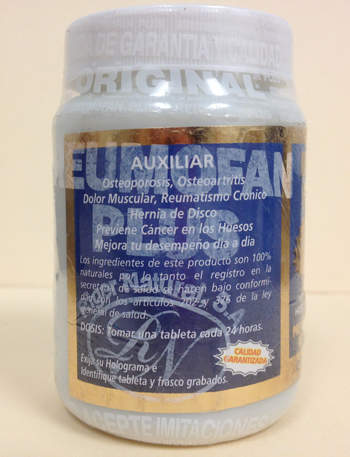For Consumers
Reumofan Products Pose Risk to Consumers
 |
Reumofan Plus and Reumofan Plus Premium are labeled in Spanish. But versions of these products may exist with labels in English. See more images of Reumofan products on Flickr. http://www.flickr.com/search/?q=reumofan |
 Get Consumer Updates by E-mail
Get Consumer Updates by E-mail
 Share copies of this article (754 KB)
Share copies of this article (754 KB)
The Food and Drug Administration (FDA) is warning consumers about the risks they face if they take Reumofan Plus and Reumofan Plus Premium, products marketed as “dietary supplements” that have hidden drug ingredients that can cause serious and potentially fatal side effects.
Because of the possible risks, consumers should not buy or start using these products.
FDA is issuing an updated alert that Reumofan Plus and Reumofan Plus Premium contain undeclared active ingredients found in prescription drugs that should be used only under the supervision of a health care professional.
Since June 1, 2012, when FDA first warned the public about the dangers of these supplements, the agency has received reports of fatalities, stroke, severe bleeding in the gastrointestinal tract (including the esophagus, stomach and intestines), dizziness, insomnia (difficulty sleeping), high blood sugar levels and problems with liver and kidney functions, as well as corticosteroid withdrawal syndrome.
“Consumers who are currently taking Reumofan Plus or Reumofan Plus Premium, or who have recently stopped taking it, should immediately consult a health care professional,” says Elizabeth Miller, Pharm.D., acting director of FDA’s Division of Non-Prescription Drugs and Health Fraud.
Miller notes that because one of the drugs found in Reumofan products is a corticosteroid, it is not advisable to stop taking the supplements without medical guidance. Corticosteroids are drugs used to reduce inflammation. Sudden discontinuation could cause withdrawal syndrome and life-threatening suppression of the adrenal glands, which regulate a number of hormones and body functions. The risk of withdrawal syndrome depends upon a number of variables that must be assessed by a health care professional.
Reumofan Plus and Reumofan Plus Premium are marketed as “natural” dietary supplements for treatment of arthritis, muscle pain, osteoporosis (the thinning of bone tissue and loss of bone density), bone cancer and other conditions. The law defines dietary supplements, in part, as products that contain “dietary” ingredients, such as vitamins, minerals, amino acids, herbs or other botanicals.
These products are manufactured in Mexico by Riger Naturals and sold widely on the Internet, as well as at flea markets and some retail outlets. FDA has worked with the Mexican Ministry of Health, which issued a health warning to the public and ordered Riger Naturals to recall the product.
Natural vs. Unnatural
How do you know if a supposedly “natural” supplement actually contains potentially dangerous ingredients, especially when—as is the case with the Reumofan products—these ingredients are not listed on the label?
Daniel Fabricant, Ph.D., director of FDA’s Division of Dietary Supplement Programs, says consumers should avoid products marketed as supplements that claim to have any effects that are the same as those of prescription drugs.
Fabricant says consumers should also be wary of products in which the important information on the label appears only in a foreign language. (Reumofan Plus and Reumofan Plus Premium are labeled in Spanish, but other versions of these products with labels in English may exist.)
According to Miller, unlike the premarket review that FDA conducts for prescription and some over-the-counter drugs, “people are often surprised to learn that the law doesn’t require FDA to ensure that dietary supplements are safe and effective before they go on the market. That’s why it’s important for consumers to have heightened awareness so they can avoid products with hidden dangers.”
FDA on the Case
After receiving reports of adverse events associated with Reumofan Plus, FDA analyzed the product in one of its laboratories and found that it contains the following drug ingredients:
- diclofenac sodium—a prescription non-steroidal anti-inflammatory drug (NSAID) that may cause increased risk of cardiovascular events, such as heart attack, as well as serious gastrointestinal problems.
- methocarbamol—a prescription muscle relaxant that can cause sedation, dizziness and low blood pressure, and impair mental or physical abilities to perform tasks such as driving a motor vehicle or operating machinery.
- dexamethasone— a corticosteroid used to treat inflammatory conditions such as asthma and rheumatoid arthritis, which can increase the risk of infection, increased blood sugar levels, changes in blood pressure, damage to bones, psychiatric problems and adrenal suppression.
An FDA laboratory analysis of Reumofan Plus Premium found that it contains two of the ingredients listed above, diclofenac sodium and methocarbamol.
Miller says that the presence of dexamethasone means that people taking these supplements must work with their health care professional to slowly and safely taper off the drug. A person who abruptly stops taking corticosteroids after long-term use or after taking high doses runs the risk of suffering from withdrawal syndrome. This may include nausea, low blood pressure, low blood sugar levels, fever, muscle and joint pain, dizziness and fainting.
Any of the drug ingredients found in Reumofan Plus or Reumofan Plus Premium can also interact with other medications a consumer may be taking and result in serious health consequences.
Fabricant suggests that consumers considering using a dietary supplement should think about consulting their health care professional or a registered dietitian first to see if the product is really needed and to help distinguish between valid and questionable information.
This article appears on FDA's Consumer Updates page, which features the latest on all FDA-regulated products.
August 21, 2012








